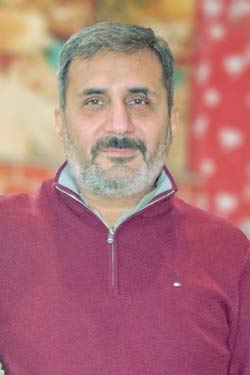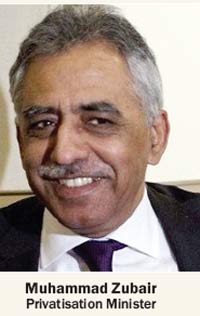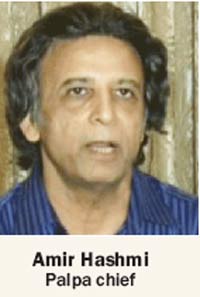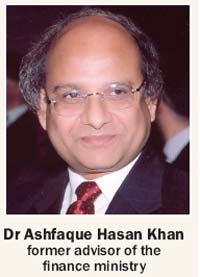After days of sabre-rattling, hopes for a breakthrough in the stalemate over the fate of the Pakistan International Airlines raised when the privatisation minister unexpectedly met with the protesting workers of the national airliner on Friday night.
After days of sabre-rattling, hopes for a breakthrough in the stalemate over the fate of the Pakistan International Airlines raised when the privatisation minister unexpectedly met with the protesting workers of the national airliner on Friday night.
But those hopes seem to be short-lived, at least for now.
 Hours after Prime Minister Nawaz Sharif’s tough talk over the issue in his speech during his address on the Kashmir Solidarity Day on February 5 in Muzaffarabad, the privatisation minister Mohammad Zubair flew to Karachi and invited leaders of the PIA trade unions for talks.
Hours after Prime Minister Nawaz Sharif’s tough talk over the issue in his speech during his address on the Kashmir Solidarity Day on February 5 in Muzaffarabad, the privatisation minister Mohammad Zubair flew to Karachi and invited leaders of the PIA trade unions for talks.
Though neither side announced any breakthrough in the talks, there were signs of ice-breaking when both sides described their negotiations as “meaningful”.
“I am very hopeful for the success of the talks,” the minister told the Money Matters on Saturday morning.
However, the Joint Action Committee (JAC) refused to budge on their strike call unless their four demands were met.
These demands include immediate withdrawal of the bill passed by the National Assembly on January 21 converting PIA into a public limited company, provision of a chance to the employees to revive the airline. Moreover, the Joint Action Committee rejected government plans to sell off 26 percent of the airlines stakes to the strategic partner and also called for review of the aviation policy.
The privatisation minister said discussions on their demands could be held after they resume their duties.
“Further talks will be held if they call off the strike,” he added.
He said he impressed upon the agitating workers that there was no point of staging protests when they have not properly listened to the government’s point of view.
“I told them to sit with us and see what are our plans to turnaround the PIA,” he said, adding that he suggested to the protesting trade union leaders to not be bogged down in the debate of whether the sale of strategic shares was privatisation or not. “I urged them to listen to our point of view, and we will listen to theirs, but they have first to revoke the threat of the strike.”
He said the government plans did not just envisage selling 26 percent of the strategic shares of the PIA, but it also covered a well-thought strategy to protect the professional careers of the talented employees of PIA to help them progress in their profession.
“We told them..don’t sacrifice the jobs and careers of over 14,000 employees of the PIA for the sake of one percent useless people,” the minister added.
But after Joint Action Committee refused to withdraw the strike call, the government negotiators held a separate meeting with the Pakistan Airline Pilots’ Association (Palpa) and convinced them to resume their work.
“After talks with JAC, the Palpa leaders stayed back with us and agreed that they would resume flight operations if government provided security to them,” a government official involved in the talks said.
Palpa chief Amir Hashmi confirmed separate talks with the government team and said he had written letters to the PIA’s director flight operations as well as to the government to provide security to their people.
“We are receiving threats in public meetings as well as over telephones and it is the responsibility of the government to provide security to them,” he said.
He cited a video speech purportedly made by the trade union leader Nasir Janjua threatening Hashmi of dire consequences if he agreed to renounce the protest. The video went viral on social media and was repeatedly aired by the television networks.
“We are still part of the protest but we want to resume flight operations as it is causing problem to the ordinary passengers,” Hashmi said.
“This strike has become complex as political parties are trying to capitalise on it,” he added.
Mohammad Zubair said after Palpa’s readiness to resume operations, the interior ministry is working on a security plan for the PIA staffers who want to end the protest.
Critics believe the government’s move to open talks with the protesting PIA workers was basically aimed at scuttling Imran Khan’s protest call, who announced countrywide rallies over the February 1 violence in Karachi, instead of a well meaning attempt to end the stalemate.
They say though the government has mishandled the issue from the very first day, the things got grossly messed up after government put off its plan to privatise the national carrier for six months.
Everyone took a sigh of relief when the government decided to defer its plans in the hope that it would meaningfully engage the protesting workers to resolve the issue in an amicable manner.
But that announcement was accompanied by the hard-hitting remarks from the outspoken PML-N Senator Mushahidullah Khan who threatened the protestors of dire consequences if they went ahead with their strike call.
Information Minister Pervez Rashid’s statement that the government would “cut the wings” of those blocking the PIA operations added fuel to the fire.
The situation took the worst turn on February 1 when two PIA workers were killed during protest in Karachi, which grounded PIA not just in Karachi, but throughout the country.
It was for the first time in the history of the country as well as of the PIA that the entire operations of the national flag carrier came to a grinding halt.
Unfortunately, all this happened at the time when government was holding talks with the International Monetary Fund for the 10th review of the $6.7 billion Extended Fund Facility (EFF) in Dubai. Ironically, the privatisation of PIA was one of the many commitments made by the government to the IMF under the terms of the EFF.
The IMF negotiators gave laudatory support to the government’s economic policies and agreed to recommend their board of directors to approve the $497 million tranche of EFF.
“The mission welcomed the authorities’ strong programme performance in the second quarter of FY2015/16. All end-December 2015 quantitative performance criteria, including the budget deficit target and the floor on the State Bank of Pakistan’s net international reserves, have been met,” the IMF lead negotiator Harald Finger said in a statement.
But despite IMF’s strong public support for the government, it seems all did not go well behind-the-closed-doors.
While IMF did not make any official, public comment on the delay in the privatisation of PIA and Finance Minister Ishaq Dar at his news conference committed there will be no rollback of the government’s privatisation plans, Finger made it sure that the issue of privatisation did not go unnoticed altogether.
He said in order to consolidate the economic gains and strengthen the long-tem resilience of the economy, advancing the energy sector reform, setting in motion competitiveness-enhancing improvements in the business climate, continuing to expand the tax net, and ending losses in public enterprises would be critical.
“While many structural benchmarks have been met, measures pertaining to the energy sector reform and restructuring of loss-making public enterprises are yet to be implemented,” the IMF said. “Completing these reforms will help set Pakistan on a permanently higher growth trajectory and achieve the country’s broader economic objectives,” he added.
Media reports suggested that the IMF negotiators gave a “dressing down” to the government team on the issue and it was annoyed over the “backtracking”. The government also shelved plans to privatise power supply companies and will miss deadlines to sell other-loss making firms.
Observers say the IMF is unlikely to create hurdles in the disbursement of the remaining tranches of its loan, but PIA stalemate has sent wrong signals to foreign investors who may be willing to put in their money into Pakistan.
Though the opposition political parties could not be absolved from the blame for trying to get political mileage out of the sensitive national issue, the main responsibility for mismanaging the whole affairs rests on the government.
Government officials believe that political parties, mainly Pakistan Peoples Party (PPP) and Pakistan Tehreek-e-Insaf (PTI), have tried to cash in on the PIA protest.
They say PPP had made reckless appointments in the PIA on political basis and it is supporting the protest not only to give protection to its appointees but also to settle scores with the government for the troubles faced by it in the wake of the Rangers operation in Karachi.
They say Imran Khan too, after failing to dislodge the government through his sit-in politics, is trying to destabilise the government through his agitation-politics.
The government critics, however, say exploiting vulnerabilities of the government for political gains by the opposition parties is a normal practice in a political culture and it is the responsibility of the government to tread prudently in such situation. It should not let it to get out of control.
They say the prime minister too was ill-advised to talk tough with the protestors. They say instead of hurling threats, the government leaders should have tried to cool down the situation after the killing of the PIA workers.
 “This issue is badly mishandled,” Dr Ashfauque Hasan Khan, former advisor of the finance ministry and a long-time critique of the government’s economic policies said. “If you are well-intended and really want to turnaround PIA then you need to take serious steps to revive the airliner. But if you have someone in your mind to be rewarded and gifted, then it is a separate issue.”
“This issue is badly mishandled,” Dr Ashfauque Hasan Khan, former advisor of the finance ministry and a long-time critique of the government’s economic policies said. “If you are well-intended and really want to turnaround PIA then you need to take serious steps to revive the airliner. But if you have someone in your mind to be rewarded and gifted, then it is a separate issue.”
He maintained that the government did not take any measure to restructure and reform the PIA before putting it for sale.
He said the government should chalk out a PIA revival plan for two to three years by setting well-defined benchmarks before deciding whether it should be sold or not. “If you have bought a car in 2010 and you want to sell it in 2016 with an intention to fetch a good price for it then you would like to repair and refurbish it before selling it. The same way, if you want to sell PIA then you need to revive it in order to get a good price for it,” he said.
He said the government can start these reforms by outsourcing some services of the PIA like catering to reduce the financial burden on the airliner.
“The question of its sale will come up only if you cannot revive it on your own,” he added.
The writer is a senior journalist based in Islamabad